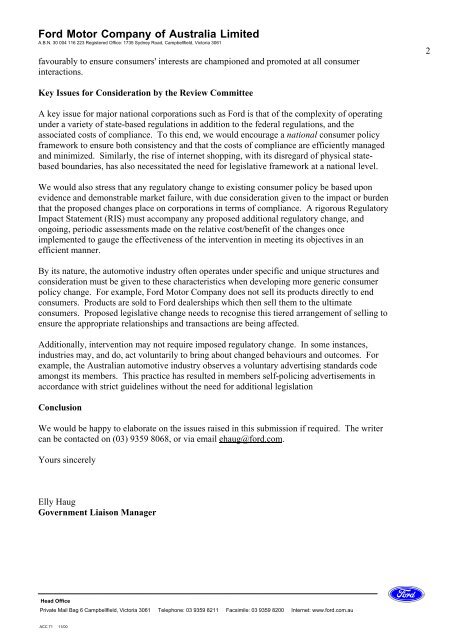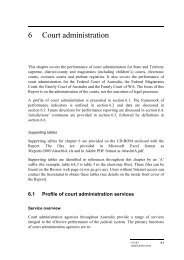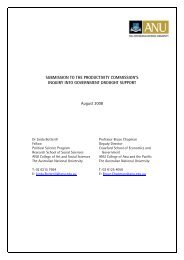Ford Motor Company of Australia Limited - Productivity Commission
Ford Motor Company of Australia Limited - Productivity Commission
Ford Motor Company of Australia Limited - Productivity Commission
Create successful ePaper yourself
Turn your PDF publications into a flip-book with our unique Google optimized e-Paper software.
<strong>Ford</strong> <strong>Motor</strong> <strong>Company</strong> <strong>of</strong> <strong>Australia</strong> <strong>Limited</strong><br />
A.B.N. 30 004 116 223 Registered Office: 1735 Sydney Road, Campbellfield, Victoria 3061<br />
favourably to ensure consumers' interests are championed and promoted at all consumer<br />
interactions.<br />
2<br />
Key Issues for Consideration by the Review Committee<br />
A key issue for major national corporations such as <strong>Ford</strong> is that <strong>of</strong> the complexity <strong>of</strong> operating<br />
under a variety <strong>of</strong> state-based regulations in addition to the federal regulations, and the<br />
associated costs <strong>of</strong> compliance. To this end, we would encourage a national consumer policy<br />
framework to ensure both consistency and that the costs <strong>of</strong> compliance are efficiently managed<br />
and minimized. Similarly, the rise <strong>of</strong> internet shopping, with its disregard <strong>of</strong> physical statebased<br />
boundaries, has also necessitated the need for legislative framework at a national level.<br />
We would also stress that any regulatory change to existing consumer policy be based upon<br />
evidence and demonstrable market failure, with due consideration given to the impact or burden<br />
that the proposed changes place on corporations in terms <strong>of</strong> compliance. A rigorous Regulatory<br />
Impact Statement (RIS) must accompany any proposed additional regulatory change, and<br />
ongoing, periodic assessments made on the relative cost/benefit <strong>of</strong> the changes once<br />
implemented to gauge the effectiveness <strong>of</strong> the intervention in meeting its objectives in an<br />
efficient manner.<br />
By its nature, the automotive industry <strong>of</strong>ten operates under specific and unique structures and<br />
consideration must be given to these characteristics when developing more generic consumer<br />
policy change. For example, <strong>Ford</strong> <strong>Motor</strong> <strong>Company</strong> does not sell its products directly to end<br />
consumers. Products are sold to <strong>Ford</strong> dealerships which then sell them to the ultimate<br />
consumers. Proposed legislative change needs to recognise this tiered arrangement <strong>of</strong> selling to<br />
ensure the appropriate relationships and transactions are being affected.<br />
Additionally, intervention may not require imposed regulatory change. In some instances,<br />
industries may, and do, act voluntarily to bring about changed behaviours and outcomes. For<br />
example, the <strong>Australia</strong>n automotive industry observes a voluntary advertising standards code<br />
amongst its members. This practice has resulted in members self-policing advertisements in<br />
accordance with strict guidelines without the need for additional legislation<br />
Conclusion<br />
We would be happy to elaborate on the issues raised in this submission if required. The writer<br />
can be contacted on (03) 9359 8068, or via email ehaug@ford.com.<br />
Yours sincerely<br />
Elly Haug<br />
Government Liaison Manager<br />
Head Office<br />
Private Mail Bag 6 Campbellfield, Victoria 3061 Telephone: 03 9359 8211 Facsimile: 03 9359 8200 Internet: www.ford.com.au<br />
ACC 71 11/00

















